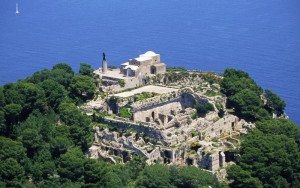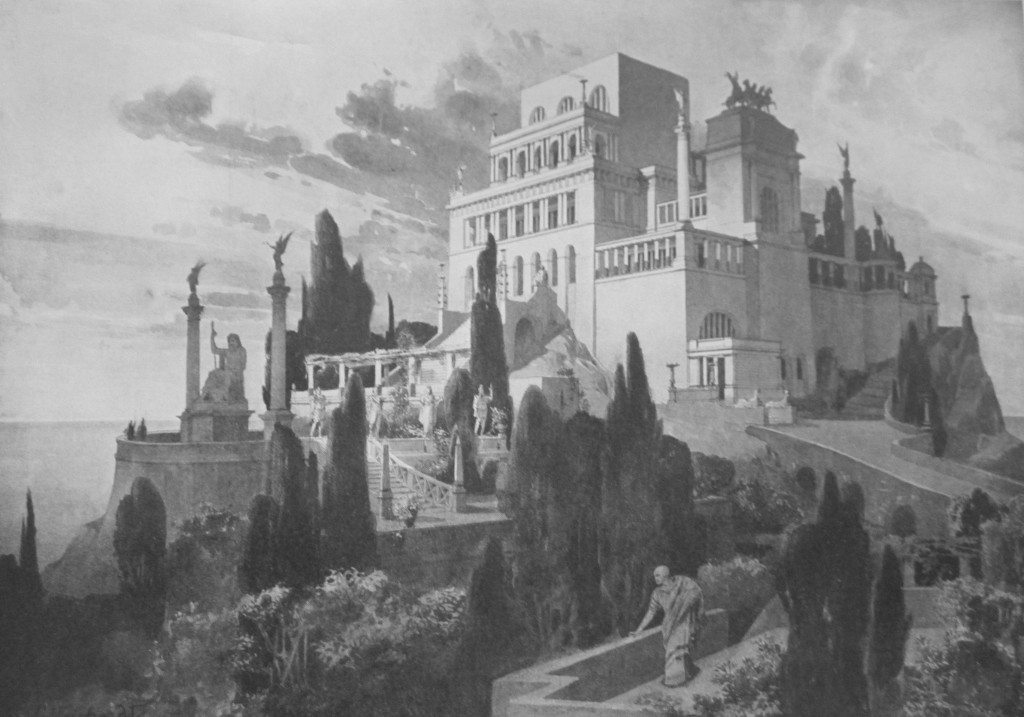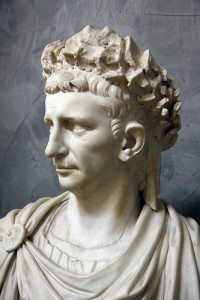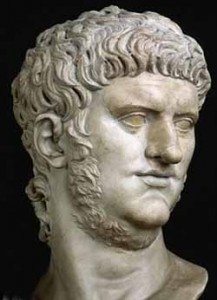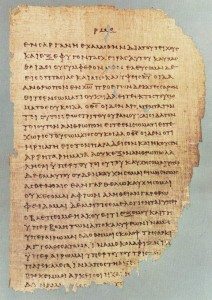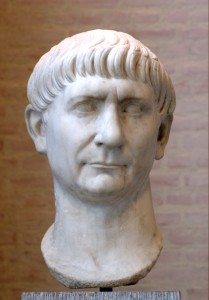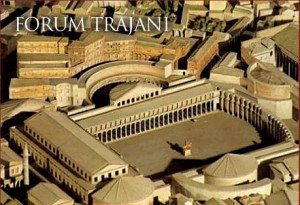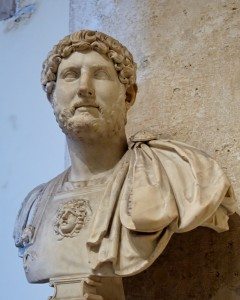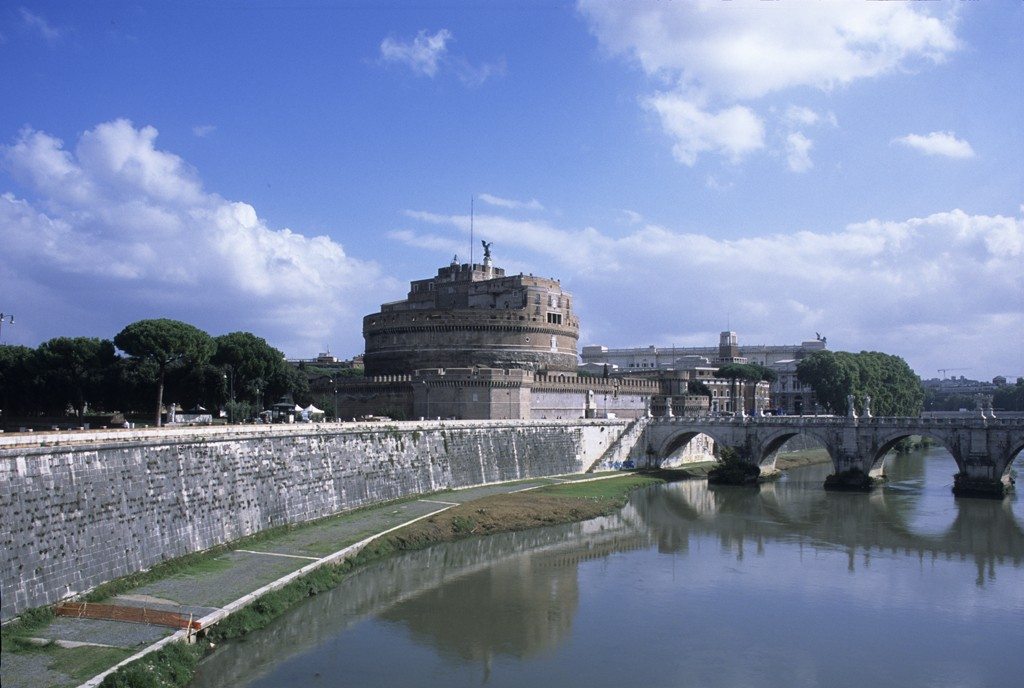Week 11
Week 11: Monday, January 9, 2023
Antony and Cleopatra
The period from the death of Julius Caesar to the final triumph of Octavian (44-31 BC) is the period of the Civil War. A number of critical battles take place during these 14 years, but central to them all is the figure of Mark Antony. And in the later years of the war, it becomes a partnership between the Roman general and the Egyptian queen. Their story is one of the most famous romances of all time. We will talk about the Civil War, Mark Antony, and Cleopatra this week.
Philippi: The Battle of Philippi was the final battle in the Wars of the Second Triumvirate between the forces of Mark Antony and Octavian (of the Second Triumvirate) and the forces of Julius Caesar's assassins Marcus Junius Brutus and Gaius Cassius Longinus in 42 BC, at Philippi in Macedonia. The Second Triumvirate declared this civil war to avenge Julius Caesar's murder. (Wikipedia)
Actium: The Battle of Actium was the decisive confrontation of the Final War of the Roman Republic, a naval engagement between Octavian and the combined forces of Mark Antony and Cleopatra on 2 September 31 BC, on the Ionian Sea near the city of Actium, in the Roman province of Epirus vetus in Greece. Octavian's fleet was commanded by Marcus Vipsanius Agrippa, while Antony's fleet was supported by the ships of Queen Cleopatra of Ptolemaic Egypt. (Wikipedia)
READING:
Michael Grant, History of Rome, Part VI, Chapter 13, "Augustus."
HIGHLY RECOMMENDED BOOK
FOR THE WHOLE YEAR OF HISTORY OF ROME
You will all want one book to use as an introduction and as a kind of reference book to search out answers and maps and other study helps for this year of study on ancient Rome. I have searched for such a book, and although there are newer ones than this classic by one of the truly great experts on Rome, there really is nothing better. This is a one-volume, basic introduction to the whole subject of our year of study. It covers the period from the Republic to the Decline and Fall. So I encourage you to get a copy of this book. It is out of print so you will have to sort through the used book options but there are many copies available as of August, 2013. Dont buy the "new" from the UK since I have no idea whether this is a quality reprint or not. So go get a used hardcover for $10.00. At that price amazon says "very good" so thats a great deal. A used hardcover is more likely to have endured in good shape than a paperback. But we may exhaust the supplies of used hardcovers so dont be afraid of a used paperback if the seller says it is in excellent condition. There are many used paperback copies that they describe as "like new," so there is nothing wrong with that.

Michael Grant,
History of Rome,
Prentice Hall,
ISBN 0023456108
About the Author :
Michael Grant (1914-2004) was a historian whose over forty publications on ancient Rome and Greece popularised the classical and early Christian world. He studied at Trinity College, Cambridge, served in intelligence and as a diplomat during the Second World War, and afterwards became deputy director of the British Council's European division, when he also published his first book. He later returned to academia, teaching at Cambridge and Edinburgh, and serving as Vice Chancellor at the University of Khartoum and at Queen's University, Belfast.
RECOMMENDED READING:
Goldsworthy presents a wonderful exploration of Caesar's life, including his military and political conquests, revealing his personality in a sympathetic telling. Many, many books have been written about Caesar and his time. This one is very accessible and worthwhile, and, I think, the best.
12
Week 12: Monday, January 16, 2023
Augustus
Anthony Everitt on Augustus: "His career was a masterly study in the wielding of power. He learned how to obtain it and, more important, how to keep it. As the history of the last hundred years has shown, empires are hard won and easily lost. In the first century B.C., Rome governed one of the largest empires the world had seen, but through foolish policies and bad governance risked its collapse. Augustus devised a political system that enabled the empire's survival for half a millennium. History never repeats itself exactly, but today's leaders and students of politics will find his policies and methods to be of interest. . . .Augustus was a very great man, but he grew gradually into greatness. He did not possess Julius Caesar's bravura and political genius (it was that genius, of course, which killed Caesar, for it made him incapable of compromise). He was a physical coward who taught himself to be brave. He was intelligent, painstaking, and patient, but could also be cruel and ruthless. He worked extraordinarily hard. He thought in the long term, achieving his aims slowly and by trial and error. Augustus is one of the few historical figures who improved with the passage of time." Everitt, Anthony,Augustus: The Life of Rome's First Emperor." see link below.
READING:
Michael Grant, History of Rome, Part VI, Chapter 13, "Augustus"
RECOMMENDED READING:
Here is an excellent new biography of Augustus by one of our favorite authors, Anthony Everitt, whose biography of Cicero is also excellent.

Anthony Everitt,
Augustus: The Life of Rome's First Emperor,
Random House,
ISBN 0812970586
Publishers Weekly
British author Everitt begins his biography of Augustus (63 B.C. - A.D. 14) with a novelistic reconstruction of the Roman emperor's last days, offering a new spin on his murder at the hands of his wife, Livia. Everitt presents the death as an assisted suicide intended to speed and secure the transition of imperial power to his stepson Tiberius. Later, Everitt presents a careful historical argument for this theory—and, save for a few other shadowy incidents such as the banishment of the poet Ovid, he keeps guesswork to a minimum, building his narrative carefully on solid evidence. Everitt (Cicero) makes Augustus's rapid rise through Roman society comprehensible to contemporary readers, deftly shifting through the major phases of his life, from childhood through his adoption by his great-uncle Julius Caesar to the power struggle with Mark Antony that ended with Augustus's recognition as both imperator and princeps, or "first citizen." Everitt also neatly presents his subject's complex personality, revealing how Augustus secured a political infrastructure that would last for centuries while reportedly keeping up a highly active sex life, all the while fighting off longstanding rumors of cowardice in battle. This familiar story is fresh again in this lively retelling. (Oct. 17) Copyright © Reed Business Information, a division of Reed Elsevier Inc. All rights reserved.
13
Week 13: Monday, January 23, 2023
Augustus and His Family
During our second week discussing Augustus, we will talk about his family: Livia, the brilliant woman who shares his reign, Julia, his beautiful daughter Julia, his only biological child, whom he loves and adores above all human beings, his stepson Tiberius who he does not love, and all the grandchildren.
READING:
Michael Grant, History of Rome, Part VI, Chapter 13, "Augustus"
The Ara Pacis and the Augustan Mausoleum
The Ara Pacis Augustae (Latin, "Altar of Augustan Peace"; commonly shortened to Ara Pacis) is an altar in Rome dedicated to Peace, the Roman goddess. The monument was commissioned by the Roman Senate on 4 July 13 B.C. to honour the return of Augustus to Rome after his three years in Hispania and Gaul, and consecrated on 30 January 9 BC by the Senate in celebration of the peace brought to the Roman Empire by Augustus' military victories. The altar was meant to be a vision of the Roman civil religion. It is made up of a small functional altar at its centre, and four surrounding walls; externally, two-tier friezes run along the walls and portray the peace and fertile prosperity enjoyed as a result of the peace brought to Rome by Augustus' military supremacy (Latin: Pax Augusta). The Altar was built to remind Romans, through a visual medium, of the competence and achievements of the Julio-Claudian dynasty. The sculpture on the outside of the monument emphasise the importance of piety (pietas) and peace within the empire.
14
Week 14: Monday, January 30, 2023
Tiberius
Emperor Tiberius
At the right is a photo of Villa Jovis, the spectacular villa that the Emperor Tiberius built here on this promontory on the isle of Capri. Villa Jovis ("Villa of Jupiter") was built by emperor Tiberius and completed in AD 27. Tiberius ruled the whole Roman Empire from this Capri villa until his death in AD 37. Villa Jovis is the largest of the twelve Tiberian villas on Capri mentioned by Tacitus. The entire complex, spanning several terraces and a difference in elevation of about 40 m, covers some 7,000 m² (1.7 acres). While the remaining eight levels of walls and staircases only hint at the grandeur the building must have had in its time, recent reconstructions have shown the villa to be a remarkable testament to 1st-century Roman architecture. Below, see a reconstruction of Villa Jovis by the German architect Carl Weichardt (1846-1906) in his book, "Das Schloss des Tiberius und andere Roemerbauten auf Capri."
READING:
Michael Grant, History of Rome, Part VII, Chapter 14, "Inheritors of Empire"
RECOMMENDED READING
Here is the best book for an overview of the successors to Augustus: Tiberius, Caligula, Claudius, Nero. It is Michael Grant retelling the stories written by Suetonius in his own book of the same name.
15
Week 15: Monday, February 6, 2023
Claudius
Claudius (Latin: Tiberius Claudius Caesar Augustus Germanicus; 1 August 10 BC - 13 October AD 54)
Claudius was Roman emperor from 41 to 54. A member of the Julio-Claudian dynasty, he was the son of Drusus and Antonia Minor. He was born at Lugdunum (Lyons) in Gaul and was the first Roman Emperor to be born outside Italy. Because he was afflicted with a limp and slight deafness due to sickness at a young age, his family ostracized him and excluded him from public office until his consulship, shared with his nephew Caligula in 37. Claudius' infirmity probably saved him from the fate of many other nobles during the purges of Tiberius and Caligula's reigns; potential enemies did not see him as a serious threat. His survival led to his being declared Emperor by the Praetorian Guard after Caligula's assassination, at which point he was the last man of his family. Claudius was also mentioned by Luke the Evangelist in Acts 11:28 and Acts 18:2 of the New Testament. Despite his lack of experience, Claudius proved to be an able and efficient administrator. (Wikipedia.)
READING:
Michael Grant, History of Rome, Part VII, Chapter 14, "Inheritors of Empire"
REQUIRED READING
You can start reading Seneca this week.

Seneca,
Selected Letters,
Elaine Fantham translator,
Oxford University Press, USA (May 15, 2010),
ISBN 0199533210
RECOMMENDED READING
Here is the best book for an overview of the successors to Augustus: Tiberius, Caligula, Claudius, Nero. It is Michael Grant retelling the stories written by Suetonius in his own book of the same name.
16
Week 16: Monday, February 13, 2023
Nero and Seneca
Nero (Latin: Nero Claudius Caesar Augustus Germanicus; 15 December 37 - 9 June 68)
Nero was Roman Emperor from 54 to 68, and the last in the Julio-Claudian dynasty. Nero was adopted by his great-uncle Claudius to become his heir and successor, and succeeded to the throne in 54 following Claudius' death. During his reign, Nero focused much of his attention on diplomacy, trade, and enhancing the cultural life of the Empire. He ordered theaters built and promoted athletic games. During his reign, the redoubtable general Corbulo conducted a successful war and negotiated peace with the Parthian Empire. His general Suetonius Paulinus crushed a revolt in Britain. Nero annexed the Bosporan Kingdom to the Empire and began the First Roman–Jewish War. In 64 AD, most of Rome was destroyed in the Great Fire of Rome, which many Romans believed Nero himself had started in order to clear land for his planned palatial complex, the Domus Aurea. In 68, the rebellion of Vindex in Gaul and later the acclamation of Galba in Hispania drove Nero from the throne. Facing assassination, he committed suicide on 9 June 68 (the first Roman emperor to do so) His death ended the Julio-Claudian Dynasty, sparking a brief period of civil wars known as the Year of the Four Emperors. Nero's rule is often associated with tyranny and extravagance. He is known for many executions, including that of his mother, and the probable murder by poison of his stepbrother Britannicus. He is infamously known as the Emperor who "fiddled while Rome burned" and as an early persecutor of Christians. He was known for having captured Christians to burn them in his garden at night for a source of light. This view is based on the writings of Tacitus, Suetonius, and Cassius Dio, the main surviving sources for Nero's reign. Few surviving sources paint Nero in a favorable light. Some sources, though, including some mentioned above, portray him as an emperor who was popular with the common Roman people, especially in the East. (Wikipedia.)
Lucius Annaeus Seneca (often known simply as Seneca; c. 4 BC - AD 65) was a Roman Stoic philosopher, statesman, dramatist, and in one work humorist, of the Silver Age of Latin literature. He was tutor and later advisor to emperor Nero. While he was forced to commit suicide for alleged complicity in the Pisonian conspiracy to assassinate Nero, he may have been innocent. His father was Seneca the Elder and his elder brother was Lucius Junius Gallio Annaeanus, called Gallio in the Bible. Seneca was the exact contemporary of the Christian preacher-writer Paul.(Wikipedia.)
REQUIRED READING

Seneca,
Selected Letters,
Elaine Fantham translator,
Oxford University Press, USA (May 15, 2010),
ISBN 0199533210
RECOMMENDED READING
Here is the best book for an overview of the successors to Augustus: Tiberius, Caligula, Claudius, Nero. It is Michael Grant retelling the stories written by Suetonius in his own book of the same name.
17
Week 17: Monday, February 20, 2023
Christians in Rome
At the right you see a papyrus folio copy of Paul's Second Letter to the Corinthians written in Greek. Paul's travels and letters date to the 50's and are the earliest documents we have from early Christianity. The Pauline letters and Luke's book, The Acts of the Apostles, give us a good view of what was happening to the growing Christian community. By the 60's, thirty years after the Crucifixion, Christians had come to Rome and were a growing community. This was all undergound and illegal, and yet the the Christians flourished anyway. We assume that both Peter and Paul were there in the 60's and that they both died in the Neronian persecution of 64-65 AD. Peter was buried outside of the city in the northwest country across the Tiber river, a place now marked with the church of St. Peter's Basilica, and Paul was buried just outside the southeastern walls, a place now marked by the Basilica of St Paul's Outside the Walls. These locations were preserved in the shared memory of the Christian community through the centuries so that when Christianity was made legal in 313, Christians could build churches on these two hallowed locations. The success of the Christians in Rome during the next century suggests that the Roman state was losing its faith in its own Classical gods and also in the Roman state itself. This week we will examine this Christian success and what it means for our understanding of Imperial Rome.
READING:
Michael Grant, History of Rome, Part VII, Chapter 16, "Jews, Jesus, and Paul"
RECOMMENDED READING
Luke
The Acts of the Apostles
I like the New Jerusalem Bible version the best.
We have copies in the Institute library.
MORE RECOMMENDED READING: HISTORICAL FICTION
Here are two wonderful novels that tell about the world of early Christianity. Both deal with Luke and the Taylor Caldwell novel, Dear and Glorious Physician, is the best possible way to come to know the whole world of Luke and Paul, other than reading Luke and Acts. You will love these books if you are a fan of historical fiction.

Taylor Caldwell,
Dear and Glorious Physician, A Novel about Saint Luke,
Ignatius Press (October 30, 2008),
ISBN 1586172301
18
Week 18: Monday, February 27, 2023
Trajan
Trajan ( Latin: Imperator Caesar Nerva Traianus Divi Nervae filius Augustus; 18 September 53 - 9 August 117 AD)
Trajan was Roman Emperor from 98 AD until his death in 117 AD. Officially declared by the senate as "optimus princeps" ("the best ruler"), Trajan is remembered as a successful soldier-emperor who presided over the greatest military expansion in Roman history, leading the empire to attain its maximum territorial extent by the time of his death. He is also known for his philanthropic rule, overseeing extensive public building programs and implementing social welfare policies, which earned him his enduring reputation as the second of the Five Good Emperors who presided over an era of peace and prosperity in the Mediterranean world. Born into a non-patrician family of Italian origin in the city of Italica in the province of Hispania Baetica (Spain), Trajan rose to prominence during the reign of emperor Domitian. Serving as a legatus legionis in Hispania Tarraconensis, in 89 Trajan supported Domitian against a revolt on the Rhine led by Antonius Saturninus. In September 96, Domitian was succeeded by Marcus Cocceius Nerva, an old and childless senator who proved to be unpopular with the army. After a brief and tumultuous year in power, a revolt by members of the Praetorian Guard compelled him to adopt the more popular Trajan as his heir and successor. Nerva died on 27 January 98, and was succeeded by his adopted son without incident.
Trajan's Forum, Trajan's Column, Trajan's Market and the Neighborhood of the Quirinale Hill. The Quirinale Palace, residence of the President of Italy.
19
Week 19: Monday, March 6, 2023
Hadrian
Hadrian (Latin: Publius Aelius Hadrianus Augustus, 24 January, 76 AD - 10 July, 138 AD)
Hadrian was Roman Emperor from 117 to 138. He re-built the Pantheon and constructed the Temple of Venus and Roma. He is also known for building Hadrian's Wall, which marked the northern limit of Roman Britain. Hadrian was regarded by some as a humanist and was a lover of Greek culture in most of his tastes. He is regarded as one of the Five Good Emperors. Hadrian was born Publius Aelius Hadrianus to an ethnically Italian family, either in Italica near Santiponce (in modern-day Spain). His predecessor Trajan was a maternal cousin of Hadrian's father. Trajan never officially designated an heir, but according to his wife Pompeia Plotina, Trajan named Hadrian emperor immediately before his death. Trajan's wife and his friend Licinius Sura were well-disposed towards Hadrian, and he may well have owed his succession to them. During his reign, Hadrian traveled to nearly every province of the Empire. An ardent admirer of Greece, he sought to make Athens the cultural capital of the Empire and ordered the construction of many opulent temples in the city. He used his relationship with his Greek favorite Antinous to underline his love of Greece and led to the creation of one of the most popular cults of ancient times. He spent extensive amounts of his time with the military; he usually wore military attire and even dined and slept amongst the soldiers. He ordered military training and drilling to be more rigorous and even made use of false reports of attack to keep the army alert. Upon his accession to the throne, Hadrian withdrew from Trajan's conquests in Mesopotamia and Armenia, and even considered abandoning Dacia. Late in his reign he suppressed the Bar Kokhba revolt in Judaea, renaming the province Syria Palaestina. In 136 an ailing Hadrian adopted Lucius Aelius as his heir, but the latter died suddenly two years later. In 138, Hadrian resolved to adopt Antoninus Pius if he would in turn adopt Marcus Aurelius and Aelius' son Lucius Verus as his own eventual successors. Antoninus agreed, and soon afterward Hadrian died at Baiae.
RECOMMENDED BOOK
Anthony Everitt is one of the most popular writers among Insitute readers. His biographies of Cicero and Augustus are excellent. Here he writes about the Spanish Emperor Hadrian.

Anthony Everitt,
Hadrian and the Triumph of Rome,
Random House Trade Paperbacks; Reprint edition (September 14, 2010),
ISBN 0812978145
From Publishers Weekly:
The author of biographies of Augustus and Cicero, British scholar Everitt now combines academic expertise with lively prose in a satisfying account of the emperor who ruled Rome from 117 to 138 C.E., the man Everitt says has a good claim to have been the most successful of Rome's leaders. As a youth, Hadrian became the protege and adopted ward of future emperor Trajan. (Homosexual emperors, including Hadrian, often adopted a successor, a procedure that worked better than letting pugnacious generals fight it out.) After suppressing the Jewish revolt that had begun under Trajan, Hadrian abandoned several of his predecessor's conquests as indefensible. Traveling the empire, he shored up its defenses, which included building Hadrian's Wall in England and another across Germany. Nearing the end of a prosperous, mostly peaceful reign, he adopted two men who also ruled successfully: Antoninus Pius and Marcus Aurelius. Everitt presents the Roman Empire, in what he calls tempestuous and thrilling times, as an almost ungovernable collection of polyglot nations dominated by ambitious, frequently bloodthirsty and unscrupulous men. Readers will wonder how Rome lasted so long, but they will enjoy this skillful portrait of a good leader during its last golden age. 2 maps. (Sept. 8) Copyright © Reed Business Information, a division of Reed Elsevier Inc. All rights reserved. --This text refers to the Hardcover edition.
"Excellent . . . highly recommended . . . a skillfully analyzed and well-researched narrative." Library Journal
"One gets a clear and compelling sense of Hadrian's times." --”The New Yorker
RECOMMENDED BOOK
If you like historical fiction, this story of Hadrian is a masterpiece by the great French writer Marguerite Yourcenar written as the Memoirs of Hadrian. You will love it.
Photo Below: Hadrian's Tomb (Castello St. Angelo)
20
Week 20: Monday, March 13, 2023
Marcus Aurelius
Marcus Aurelius (Latin: Marcus Aurelius Antoninus Augustus;26 April 121 AD to March 180 AD)
Marcus Aurelius was a Roman Emperor from 161 to 180. He ruled with Lucius Verus as co-emperor from 161 until Verus' death in 169. He was the last of the Five Good Emperors, and is also considered one of the most important Stoic philosophers. During his reign, the Empire defeated a revitalized Parthian Empire in the East; Aurelius' general Avidius Cassius sacked the capital Ctesiphon in 164. In central Europe, Aurelius fought the Marcomanni, Quadi, and Sarmatians with success during the Marcomannic Wars, with the threat of the Germanic tribes beginning to represent a troubling reality for the Empire. A revolt in the East led by Avidius Cassius failed to gain momentum and was suppressed immediately. Marcus Aurelius' Stoic tome Meditations, written in Greek while on campaign between 170 and 180, is still revered as a literary monument to a philosophy of service and duty, describing how to find and preserve equanimity in the midst of conflict by following nature as a source of guidance and inspiration.
READING:
Michael Grant, History of Rome, Part VIII, Chapter 17, "Collapse and Recovery"
READING MARCUS AURELIUS:
From the Introduction by Christopher Gill for the Oxford Classics edition:
"The Meditations of Marcus Aurelius is a work without parallel among writings surviving from Classical antiquity and an exceptional work in any age and culture. It is the philosophical diary of a Roman emperor, probably written while he was campaigning in Germany near the end of his life. In short, intense, and often powerful reflections, Marcus tries to articulate his core beliefs and values."
REQUIRED READING

Marcus Aurelius,
Meditations: with selected correspondence,
Robin Hard, Christopher Gill,
Oxford University Press, USA (September 25, 2011),
ISBN 0199573204
NEXT WEEK:
SPRING VACATION TWO WEEKS
All
Week 11: Mon., Jan. 9, 2023
Antony and Cleopatra
The period from the death of Julius Caesar to the final triumph of Octavian (44-31 BC) is the period of the Civil War. A number of critical battles take place during these 14 years, but central to them all is the figure of Mark Antony. And in the later years of the war, it becomes a partnership between the Roman general and the Egyptian queen. Their story is one of the most famous romances of all time. We will talk about the Civil War, Mark Antony, and Cleopatra this week.
Philippi: The Battle of Philippi was the final battle in the Wars of the Second Triumvirate between the forces of Mark Antony and Octavian (of the Second Triumvirate) and the forces of Julius Caesar's assassins Marcus Junius Brutus and Gaius Cassius Longinus in 42 BC, at Philippi in Macedonia. The Second Triumvirate declared this civil war to avenge Julius Caesar's murder. (Wikipedia)
Actium: The Battle of Actium was the decisive confrontation of the Final War of the Roman Republic, a naval engagement between Octavian and the combined forces of Mark Antony and Cleopatra on 2 September 31 BC, on the Ionian Sea near the city of Actium, in the Roman province of Epirus vetus in Greece. Octavian's fleet was commanded by Marcus Vipsanius Agrippa, while Antony's fleet was supported by the ships of Queen Cleopatra of Ptolemaic Egypt. (Wikipedia)
READING:
Michael Grant, History of Rome, Part VI, Chapter 13, "Augustus."
HIGHLY RECOMMENDED BOOK
FOR THE WHOLE YEAR OF HISTORY OF ROME
You will all want one book to use as an introduction and as a kind of reference book to search out answers and maps and other study helps for this year of study on ancient Rome. I have searched for such a book, and although there are newer ones than this classic by one of the truly great experts on Rome, there really is nothing better. This is a one-volume, basic introduction to the whole subject of our year of study. It covers the period from the Republic to the Decline and Fall. So I encourage you to get a copy of this book. It is out of print so you will have to sort through the used book options but there are many copies available as of August, 2013. Dont buy the "new" from the UK since I have no idea whether this is a quality reprint or not. So go get a used hardcover for $10.00. At that price amazon says "very good" so thats a great deal. A used hardcover is more likely to have endured in good shape than a paperback. But we may exhaust the supplies of used hardcovers so dont be afraid of a used paperback if the seller says it is in excellent condition. There are many used paperback copies that they describe as "like new," so there is nothing wrong with that.

Michael Grant,
History of Rome,
Prentice Hall,
ISBN 0023456108
About the Author :
Michael Grant (1914-2004) was a historian whose over forty publications on ancient Rome and Greece popularised the classical and early Christian world. He studied at Trinity College, Cambridge, served in intelligence and as a diplomat during the Second World War, and afterwards became deputy director of the British Council's European division, when he also published his first book. He later returned to academia, teaching at Cambridge and Edinburgh, and serving as Vice Chancellor at the University of Khartoum and at Queen's University, Belfast.
RECOMMENDED READING:
Goldsworthy presents a wonderful exploration of Caesar's life, including his military and political conquests, revealing his personality in a sympathetic telling. Many, many books have been written about Caesar and his time. This one is very accessible and worthwhile, and, I think, the best.
Week 12: Mon., Jan. 16, 2023
Augustus
Anthony Everitt on Augustus: "His career was a masterly study in the wielding of power. He learned how to obtain it and, more important, how to keep it. As the history of the last hundred years has shown, empires are hard won and easily lost. In the first century B.C., Rome governed one of the largest empires the world had seen, but through foolish policies and bad governance risked its collapse. Augustus devised a political system that enabled the empire's survival for half a millennium. History never repeats itself exactly, but today's leaders and students of politics will find his policies and methods to be of interest. . . .Augustus was a very great man, but he grew gradually into greatness. He did not possess Julius Caesar's bravura and political genius (it was that genius, of course, which killed Caesar, for it made him incapable of compromise). He was a physical coward who taught himself to be brave. He was intelligent, painstaking, and patient, but could also be cruel and ruthless. He worked extraordinarily hard. He thought in the long term, achieving his aims slowly and by trial and error. Augustus is one of the few historical figures who improved with the passage of time." Everitt, Anthony,Augustus: The Life of Rome's First Emperor." see link below.
READING:
Michael Grant, History of Rome, Part VI, Chapter 13, "Augustus"
RECOMMENDED READING:
Here is an excellent new biography of Augustus by one of our favorite authors, Anthony Everitt, whose biography of Cicero is also excellent.

Anthony Everitt,
Augustus: The Life of Rome's First Emperor,
Random House,
ISBN 0812970586
Publishers Weekly
British author Everitt begins his biography of Augustus (63 B.C. - A.D. 14) with a novelistic reconstruction of the Roman emperor's last days, offering a new spin on his murder at the hands of his wife, Livia. Everitt presents the death as an assisted suicide intended to speed and secure the transition of imperial power to his stepson Tiberius. Later, Everitt presents a careful historical argument for this theory—and, save for a few other shadowy incidents such as the banishment of the poet Ovid, he keeps guesswork to a minimum, building his narrative carefully on solid evidence. Everitt (Cicero) makes Augustus's rapid rise through Roman society comprehensible to contemporary readers, deftly shifting through the major phases of his life, from childhood through his adoption by his great-uncle Julius Caesar to the power struggle with Mark Antony that ended with Augustus's recognition as both imperator and princeps, or "first citizen." Everitt also neatly presents his subject's complex personality, revealing how Augustus secured a political infrastructure that would last for centuries while reportedly keeping up a highly active sex life, all the while fighting off longstanding rumors of cowardice in battle. This familiar story is fresh again in this lively retelling. (Oct. 17) Copyright © Reed Business Information, a division of Reed Elsevier Inc. All rights reserved.
Week 13: Mon., Jan. 23, 2023
Augustus and His Family
During our second week discussing Augustus, we will talk about his family: Livia, the brilliant woman who shares his reign, Julia, his beautiful daughter Julia, his only biological child, whom he loves and adores above all human beings, his stepson Tiberius who he does not love, and all the grandchildren.
READING:
Michael Grant, History of Rome, Part VI, Chapter 13, "Augustus"
The Ara Pacis and the Augustan Mausoleum
The Ara Pacis Augustae (Latin, "Altar of Augustan Peace"; commonly shortened to Ara Pacis) is an altar in Rome dedicated to Peace, the Roman goddess. The monument was commissioned by the Roman Senate on 4 July 13 B.C. to honour the return of Augustus to Rome after his three years in Hispania and Gaul, and consecrated on 30 January 9 BC by the Senate in celebration of the peace brought to the Roman Empire by Augustus' military victories. The altar was meant to be a vision of the Roman civil religion. It is made up of a small functional altar at its centre, and four surrounding walls; externally, two-tier friezes run along the walls and portray the peace and fertile prosperity enjoyed as a result of the peace brought to Rome by Augustus' military supremacy (Latin: Pax Augusta). The Altar was built to remind Romans, through a visual medium, of the competence and achievements of the Julio-Claudian dynasty. The sculpture on the outside of the monument emphasise the importance of piety (pietas) and peace within the empire.
Week 14: Mon., Jan. 30, 2023
Tiberius
Emperor Tiberius
At the right is a photo of Villa Jovis, the spectacular villa that the Emperor Tiberius built here on this promontory on the isle of Capri. Villa Jovis ("Villa of Jupiter") was built by emperor Tiberius and completed in AD 27. Tiberius ruled the whole Roman Empire from this Capri villa until his death in AD 37. Villa Jovis is the largest of the twelve Tiberian villas on Capri mentioned by Tacitus. The entire complex, spanning several terraces and a difference in elevation of about 40 m, covers some 7,000 m² (1.7 acres). While the remaining eight levels of walls and staircases only hint at the grandeur the building must have had in its time, recent reconstructions have shown the villa to be a remarkable testament to 1st-century Roman architecture. Below, see a reconstruction of Villa Jovis by the German architect Carl Weichardt (1846-1906) in his book, "Das Schloss des Tiberius und andere Roemerbauten auf Capri."
READING:
Michael Grant, History of Rome, Part VII, Chapter 14, "Inheritors of Empire"
RECOMMENDED READING
Here is the best book for an overview of the successors to Augustus: Tiberius, Caligula, Claudius, Nero. It is Michael Grant retelling the stories written by Suetonius in his own book of the same name.
Week 15: Mon., Feb. 6, 2023
Claudius
Claudius (Latin: Tiberius Claudius Caesar Augustus Germanicus; 1 August 10 BC - 13 October AD 54)
Claudius was Roman emperor from 41 to 54. A member of the Julio-Claudian dynasty, he was the son of Drusus and Antonia Minor. He was born at Lugdunum (Lyons) in Gaul and was the first Roman Emperor to be born outside Italy. Because he was afflicted with a limp and slight deafness due to sickness at a young age, his family ostracized him and excluded him from public office until his consulship, shared with his nephew Caligula in 37. Claudius' infirmity probably saved him from the fate of many other nobles during the purges of Tiberius and Caligula's reigns; potential enemies did not see him as a serious threat. His survival led to his being declared Emperor by the Praetorian Guard after Caligula's assassination, at which point he was the last man of his family. Claudius was also mentioned by Luke the Evangelist in Acts 11:28 and Acts 18:2 of the New Testament. Despite his lack of experience, Claudius proved to be an able and efficient administrator. (Wikipedia.)
READING:
Michael Grant, History of Rome, Part VII, Chapter 14, "Inheritors of Empire"
REQUIRED READING
You can start reading Seneca this week.

Seneca,
Selected Letters,
Elaine Fantham translator,
Oxford University Press, USA (May 15, 2010),
ISBN 0199533210
RECOMMENDED READING
Here is the best book for an overview of the successors to Augustus: Tiberius, Caligula, Claudius, Nero. It is Michael Grant retelling the stories written by Suetonius in his own book of the same name.
Week 16: Mon., Feb. 13, 2023
Nero and Seneca
Nero (Latin: Nero Claudius Caesar Augustus Germanicus; 15 December 37 - 9 June 68)
Nero was Roman Emperor from 54 to 68, and the last in the Julio-Claudian dynasty. Nero was adopted by his great-uncle Claudius to become his heir and successor, and succeeded to the throne in 54 following Claudius' death. During his reign, Nero focused much of his attention on diplomacy, trade, and enhancing the cultural life of the Empire. He ordered theaters built and promoted athletic games. During his reign, the redoubtable general Corbulo conducted a successful war and negotiated peace with the Parthian Empire. His general Suetonius Paulinus crushed a revolt in Britain. Nero annexed the Bosporan Kingdom to the Empire and began the First Roman–Jewish War. In 64 AD, most of Rome was destroyed in the Great Fire of Rome, which many Romans believed Nero himself had started in order to clear land for his planned palatial complex, the Domus Aurea. In 68, the rebellion of Vindex in Gaul and later the acclamation of Galba in Hispania drove Nero from the throne. Facing assassination, he committed suicide on 9 June 68 (the first Roman emperor to do so) His death ended the Julio-Claudian Dynasty, sparking a brief period of civil wars known as the Year of the Four Emperors. Nero's rule is often associated with tyranny and extravagance. He is known for many executions, including that of his mother, and the probable murder by poison of his stepbrother Britannicus. He is infamously known as the Emperor who "fiddled while Rome burned" and as an early persecutor of Christians. He was known for having captured Christians to burn them in his garden at night for a source of light. This view is based on the writings of Tacitus, Suetonius, and Cassius Dio, the main surviving sources for Nero's reign. Few surviving sources paint Nero in a favorable light. Some sources, though, including some mentioned above, portray him as an emperor who was popular with the common Roman people, especially in the East. (Wikipedia.)
Lucius Annaeus Seneca (often known simply as Seneca; c. 4 BC - AD 65) was a Roman Stoic philosopher, statesman, dramatist, and in one work humorist, of the Silver Age of Latin literature. He was tutor and later advisor to emperor Nero. While he was forced to commit suicide for alleged complicity in the Pisonian conspiracy to assassinate Nero, he may have been innocent. His father was Seneca the Elder and his elder brother was Lucius Junius Gallio Annaeanus, called Gallio in the Bible. Seneca was the exact contemporary of the Christian preacher-writer Paul.(Wikipedia.)
REQUIRED READING

Seneca,
Selected Letters,
Elaine Fantham translator,
Oxford University Press, USA (May 15, 2010),
ISBN 0199533210
RECOMMENDED READING
Here is the best book for an overview of the successors to Augustus: Tiberius, Caligula, Claudius, Nero. It is Michael Grant retelling the stories written by Suetonius in his own book of the same name.
Week 17: Mon., Feb. 20, 2023
Christians in Rome
At the right you see a papyrus folio copy of Paul's Second Letter to the Corinthians written in Greek. Paul's travels and letters date to the 50's and are the earliest documents we have from early Christianity. The Pauline letters and Luke's book, The Acts of the Apostles, give us a good view of what was happening to the growing Christian community. By the 60's, thirty years after the Crucifixion, Christians had come to Rome and were a growing community. This was all undergound and illegal, and yet the the Christians flourished anyway. We assume that both Peter and Paul were there in the 60's and that they both died in the Neronian persecution of 64-65 AD. Peter was buried outside of the city in the northwest country across the Tiber river, a place now marked with the church of St. Peter's Basilica, and Paul was buried just outside the southeastern walls, a place now marked by the Basilica of St Paul's Outside the Walls. These locations were preserved in the shared memory of the Christian community through the centuries so that when Christianity was made legal in 313, Christians could build churches on these two hallowed locations. The success of the Christians in Rome during the next century suggests that the Roman state was losing its faith in its own Classical gods and also in the Roman state itself. This week we will examine this Christian success and what it means for our understanding of Imperial Rome.
READING:
Michael Grant, History of Rome, Part VII, Chapter 16, "Jews, Jesus, and Paul"
RECOMMENDED READING
Luke
The Acts of the Apostles
I like the New Jerusalem Bible version the best.
We have copies in the Institute library.
MORE RECOMMENDED READING: HISTORICAL FICTION
Here are two wonderful novels that tell about the world of early Christianity. Both deal with Luke and the Taylor Caldwell novel, Dear and Glorious Physician, is the best possible way to come to know the whole world of Luke and Paul, other than reading Luke and Acts. You will love these books if you are a fan of historical fiction.

Taylor Caldwell,
Dear and Glorious Physician, A Novel about Saint Luke,
Ignatius Press (October 30, 2008),
ISBN 1586172301
Week 18: Mon., Feb. 27, 2023
Trajan
Trajan ( Latin: Imperator Caesar Nerva Traianus Divi Nervae filius Augustus; 18 September 53 - 9 August 117 AD)
Trajan was Roman Emperor from 98 AD until his death in 117 AD. Officially declared by the senate as "optimus princeps" ("the best ruler"), Trajan is remembered as a successful soldier-emperor who presided over the greatest military expansion in Roman history, leading the empire to attain its maximum territorial extent by the time of his death. He is also known for his philanthropic rule, overseeing extensive public building programs and implementing social welfare policies, which earned him his enduring reputation as the second of the Five Good Emperors who presided over an era of peace and prosperity in the Mediterranean world. Born into a non-patrician family of Italian origin in the city of Italica in the province of Hispania Baetica (Spain), Trajan rose to prominence during the reign of emperor Domitian. Serving as a legatus legionis in Hispania Tarraconensis, in 89 Trajan supported Domitian against a revolt on the Rhine led by Antonius Saturninus. In September 96, Domitian was succeeded by Marcus Cocceius Nerva, an old and childless senator who proved to be unpopular with the army. After a brief and tumultuous year in power, a revolt by members of the Praetorian Guard compelled him to adopt the more popular Trajan as his heir and successor. Nerva died on 27 January 98, and was succeeded by his adopted son without incident.
Trajan's Forum, Trajan's Column, Trajan's Market and the Neighborhood of the Quirinale Hill. The Quirinale Palace, residence of the President of Italy.
Week 19: Mon., Mar. 6, 2023
Hadrian
Hadrian (Latin: Publius Aelius Hadrianus Augustus, 24 January, 76 AD - 10 July, 138 AD)
Hadrian was Roman Emperor from 117 to 138. He re-built the Pantheon and constructed the Temple of Venus and Roma. He is also known for building Hadrian's Wall, which marked the northern limit of Roman Britain. Hadrian was regarded by some as a humanist and was a lover of Greek culture in most of his tastes. He is regarded as one of the Five Good Emperors. Hadrian was born Publius Aelius Hadrianus to an ethnically Italian family, either in Italica near Santiponce (in modern-day Spain). His predecessor Trajan was a maternal cousin of Hadrian's father. Trajan never officially designated an heir, but according to his wife Pompeia Plotina, Trajan named Hadrian emperor immediately before his death. Trajan's wife and his friend Licinius Sura were well-disposed towards Hadrian, and he may well have owed his succession to them. During his reign, Hadrian traveled to nearly every province of the Empire. An ardent admirer of Greece, he sought to make Athens the cultural capital of the Empire and ordered the construction of many opulent temples in the city. He used his relationship with his Greek favorite Antinous to underline his love of Greece and led to the creation of one of the most popular cults of ancient times. He spent extensive amounts of his time with the military; he usually wore military attire and even dined and slept amongst the soldiers. He ordered military training and drilling to be more rigorous and even made use of false reports of attack to keep the army alert. Upon his accession to the throne, Hadrian withdrew from Trajan's conquests in Mesopotamia and Armenia, and even considered abandoning Dacia. Late in his reign he suppressed the Bar Kokhba revolt in Judaea, renaming the province Syria Palaestina. In 136 an ailing Hadrian adopted Lucius Aelius as his heir, but the latter died suddenly two years later. In 138, Hadrian resolved to adopt Antoninus Pius if he would in turn adopt Marcus Aurelius and Aelius' son Lucius Verus as his own eventual successors. Antoninus agreed, and soon afterward Hadrian died at Baiae.
RECOMMENDED BOOK
Anthony Everitt is one of the most popular writers among Insitute readers. His biographies of Cicero and Augustus are excellent. Here he writes about the Spanish Emperor Hadrian.

Anthony Everitt,
Hadrian and the Triumph of Rome,
Random House Trade Paperbacks; Reprint edition (September 14, 2010),
ISBN 0812978145
From Publishers Weekly:
The author of biographies of Augustus and Cicero, British scholar Everitt now combines academic expertise with lively prose in a satisfying account of the emperor who ruled Rome from 117 to 138 C.E., the man Everitt says has a good claim to have been the most successful of Rome's leaders. As a youth, Hadrian became the protege and adopted ward of future emperor Trajan. (Homosexual emperors, including Hadrian, often adopted a successor, a procedure that worked better than letting pugnacious generals fight it out.) After suppressing the Jewish revolt that had begun under Trajan, Hadrian abandoned several of his predecessor's conquests as indefensible. Traveling the empire, he shored up its defenses, which included building Hadrian's Wall in England and another across Germany. Nearing the end of a prosperous, mostly peaceful reign, he adopted two men who also ruled successfully: Antoninus Pius and Marcus Aurelius. Everitt presents the Roman Empire, in what he calls tempestuous and thrilling times, as an almost ungovernable collection of polyglot nations dominated by ambitious, frequently bloodthirsty and unscrupulous men. Readers will wonder how Rome lasted so long, but they will enjoy this skillful portrait of a good leader during its last golden age. 2 maps. (Sept. 8) Copyright © Reed Business Information, a division of Reed Elsevier Inc. All rights reserved. --This text refers to the Hardcover edition.
"Excellent . . . highly recommended . . . a skillfully analyzed and well-researched narrative." Library Journal
"One gets a clear and compelling sense of Hadrian's times." --”The New Yorker
RECOMMENDED BOOK
If you like historical fiction, this story of Hadrian is a masterpiece by the great French writer Marguerite Yourcenar written as the Memoirs of Hadrian. You will love it.
Photo Below: Hadrian's Tomb (Castello St. Angelo)
Week 20: Mon., Mar. 13, 2023
Marcus Aurelius
Marcus Aurelius (Latin: Marcus Aurelius Antoninus Augustus;26 April 121 AD to March 180 AD)
Marcus Aurelius was a Roman Emperor from 161 to 180. He ruled with Lucius Verus as co-emperor from 161 until Verus' death in 169. He was the last of the Five Good Emperors, and is also considered one of the most important Stoic philosophers. During his reign, the Empire defeated a revitalized Parthian Empire in the East; Aurelius' general Avidius Cassius sacked the capital Ctesiphon in 164. In central Europe, Aurelius fought the Marcomanni, Quadi, and Sarmatians with success during the Marcomannic Wars, with the threat of the Germanic tribes beginning to represent a troubling reality for the Empire. A revolt in the East led by Avidius Cassius failed to gain momentum and was suppressed immediately. Marcus Aurelius' Stoic tome Meditations, written in Greek while on campaign between 170 and 180, is still revered as a literary monument to a philosophy of service and duty, describing how to find and preserve equanimity in the midst of conflict by following nature as a source of guidance and inspiration.
READING:
Michael Grant, History of Rome, Part VIII, Chapter 17, "Collapse and Recovery"
READING MARCUS AURELIUS:
From the Introduction by Christopher Gill for the Oxford Classics edition:
"The Meditations of Marcus Aurelius is a work without parallel among writings surviving from Classical antiquity and an exceptional work in any age and culture. It is the philosophical diary of a Roman emperor, probably written while he was campaigning in Germany near the end of his life. In short, intense, and often powerful reflections, Marcus tries to articulate his core beliefs and values."
REQUIRED READING

Marcus Aurelius,
Meditations: with selected correspondence,
Robin Hard, Christopher Gill,
Oxford University Press, USA (September 25, 2011),
ISBN 0199573204
NEXT WEEK:
SPRING VACATION TWO WEEKS

